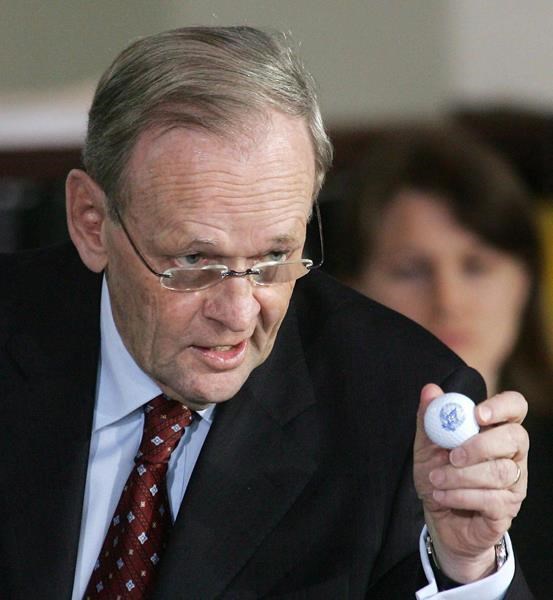OTTAWA — The word “unprecedented” applies to some aspects of the massive public inquiry underway in Ottawa.
After all, the commission is investigating the first-time use of the federal Emergencies Act during the “Freedom Convoy,” protests last winter that decried extraordinary restrictions during a global pandemic.
But this week’s dramatic conclusion of the Public Order Emergency Commission hearings won’t mark the first time a Canadian prime minister has taken the stand in a commission of inquiry.
The country’s first prime minister, Sir John A. Macdonald, testified at a royal commission on the Canadian Pacific Railway in 1873. The first question was phrased as such: “Will you have the goodness to state to the commission all the facts within your knowledge related to this matter?” And the answer began: “I suppose it had better be done as a narrative?”
It was more than 100 years before another prime minister would make himself so available. Here are the few occasions when modern leaders put themselves under oath, and the consequences that followed.
1980: Pierre Trudeau
Unlike his son, Pierre Trudeau refused to testify publicly in the McDonald Commission, which the then-Liberal government struck in 1977 to investigate “certain activities of the RCMP.”
The elder Trudeau did talk behind closed doors, though, and his 1980 testimony was wrapped into the final reports delivered in 1981 by Alberta judge David Cargill McDonald. So was the reasoning and legal opinion behind the commission’s decision not to compel him as a public witness.
The reports detailed allegations of wrongdoing by the then-RCMP Security Service, which was responsible for national security intelligence and policing at the time and had been blamed for failing to prevent the 1970 October Crisis.
Its recommendations included the creation of a new civilian spy agency, which led to the genesis of the Canadian Security Intelligence Service in 1984. McDonald also recommended updates to the War Measures Act and the role of Parliament during emergencies — some of which were ultimately incorporated into the 1988 Emergencies Act.
Trudeau retired from politics in 1984 and was succeeded by John Turner, who suffered a landslide defeat in a federal election the same year.
2005: Jean Chrétien
In early 2004, on the heels of his takeover of the Liberal party from Jean Chrétien, then-prime minister Paul Martin called a commission of inquiry into the sponsorship program and advertising activities, led by Quebec justice John Gomery.
The Gomery Inquiry, as it became known, dug into the sponsorship scandal that had for years plagued the Liberal government. Audits and media reports had raised serious questions of impropriety in a sponsorship program intended to promote federalism in Quebec following the 1995 referendum.
Chrétien appeared before the inquiry in February 2005, armed with a full-throated defence of his efforts to protect federalism — and a briefcase full of golf balls.
The former prime minister’s lawyers argued that Gomery should be removed from the inquiry because he had criticized Chrétien publicly for allowing his name to be printed on a series of golf balls. In a memorable stunt, Chrétien’s lawyer gave him a chance at the end of his testimony to pull out various golf-ball gifts he’d received from the likes of American presidents.
Chrétien maintained his innocence and said he knew nothing of the specifics of sponsorship contracts, but Gomery found him “accountable for the defective manner” in which the program was implemented in a final report that November. Some of those involved were criminally charged.
But Chrétien and a top aide later sued the federal government over the findings and won, with a Federal Court judge finding in 2008 that Gomery exhibited bias against the former prime minister. The government lost an appeal of that decision in 2010.
2005: Paul Martin
Martin was the sitting prime minister when he testified at the Gomery Inquiry days after Chrétien took the stand.
He distanced himself from the sponsorship program and argued that as the minister of finance under Chrétien, he had overseen federal government spending writ large without knowing of granular details at the departmental level.
Ultimately, Gomery cleared Martin of personal responsibility. But there was a heavy political toll on the Liberals.
Within a month of the report, Martin lost a confidence vote in the House of Commons, triggering an election in January 2006 that vaulted Stephen Harper’s new Conservative Party into power.
2009: Brian Mulroney
In 2008, Harper appointed Manitoba justice Jeffrey Oliphant to investigate the allegation that a German-Canadian arms lobbyist gave large sums of cash to Mulroney in 1993 and 1994 in relation to proposed armoured vehicle manufacturing.
In May 2009, Mulroney, who had urged Harper that a public inquiry was the only way to clear his name, was called in to testify.
During six days of testimony, he said it was “preposterous” to suggest he had been hired to lobby the government while he was running it. He said the business relationship was legal and involved “no wrongdoing of any kind,” but that he regretted the decision to accept cash.
Oliphant found that the cash payments could only be a scheme to avoid the relationship falling under public scrutiny. But he didn’t find evidence that any money changed hands while Mulroney was prime minister — though they’d met as many as a dozen times.
Oliphant found that Mulroney had failed to live up to his own ethics guidelines, applying the standard of conflict-of-interest rules introduced while he was in office in 1985.
This report by The Canadian Press was first published Nov. 22, 2022.
Marie-Danielle Smith, The Canadian Press
Related




























